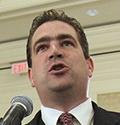
Our elections are supposed to be the greatest opportunity to make our voices heard in deciding who we send to Tallahassee. We expect that the people we elect will represent the voters that elected them to office. Unfortunately, the Florida Legislature has become a body that represents the special interest that contributes the most money to their election efforts.
Our campaign finance laws place limits on how much anyone can contribute to a campaign account: $3,000 to state gubernatorial and Cabinet races and $1,500 to state House and Senate races. All contributors must be disclosed in candidate finance reports.
The idea behind the limit on candidate campaign contributions is to equalize the influence of any one person or corporation. I can donate $3,000 to a candidate and Florida Power and Light can only donate $3,000 to a candidate. In theory, I have as much influence as a major corporation.
So how does a special interest gain power and influence? In Florida, election law allows candidates and elected officials to open and operate a “political committee,” much like the federal PACs we always here about in Washington DC except that filed federal candidates and elected officials cannot be involved in any way with a federal PAC. However, political committees in Florida can accept unlimited contributions and spend unlimited amounts of money. This has made the traditional candidate campaign account with limits on contributions meaningless.
The worst aspect of political committees is how they can transfer money. A political committee can transfer money to another one, setting up a shell game and making it tough to track the original donor. Voters want to know who is funding the candidates so they can make an informed decision about which candidate will represent their interests but that’s tougher to do under this system.
Florida Power and Light (FP&L) serves as a good example of how big money is influencing elections and operating in the shadows. Contribution reports show FP&L contributed $1.5 million to political committees in 2016, including $601,500 which went to four political committees operated by Associated Industries of Florida (AIF) and $500,000 went to five political committees operated by the Florida Chamber of Commerce. AIF and the Florida Chamber sent money to other political committees connected to legislators who, in turns, transfered money to other political committees tied to other legislators. This kind of shifting of money between various political committees makes it almost impossible to know who was the original donor seeking to influence legislation. Political committees and the dark money behind them have effectively created an auction block for the powerful elite to buy legislation that benefits their special interest at the cost to the rest of us.
When the Legislature met earlier this year, state Sen. Debbie Mayfield, R-Melbourne, filed SB 1178 and state Rep. Joe Gruters, R-Sarasota, brought out HB 1057. These bills prohibited the transfer of money between political committees or electioneering communication organizations. This simple legislation would have still allowed political committees to accept unlimited contributions and spend unlimited money but would have informed the public who was the original source of those funds. These bills would have made the election process more transparent and allowed voters to make informed decisions about candidates.
Of course, politicians and the special interests who fund their elections wanted to continue to operate in the shadows. SB 1178 and HB 1057 didn’t have a chance and neither were even heard in committee. This legislation will be filed again for the 2018 session which should offer another opportunity to restore our voice in the political process and bring transparency to reign in the corrupting influence of high-dollar special interests. Florida needs a substantive debate on the issues but the current system prevents that since money and power rule the day. Citizens of all political stripes--conservatives, libertarians, moderates and progressives--should work together to support this legislation and so we can have a real debate on the issues facing Floridians.
Alexander Snitker is president of the Liberty First Network. He was the Libertarian Party’s U.S. Senate nominee in 2010. He is the campaign manager for Bob White’s bid for the Republican gubernatorial nomination.
READ MORE FROM SUNSHINE STATE NEWS


